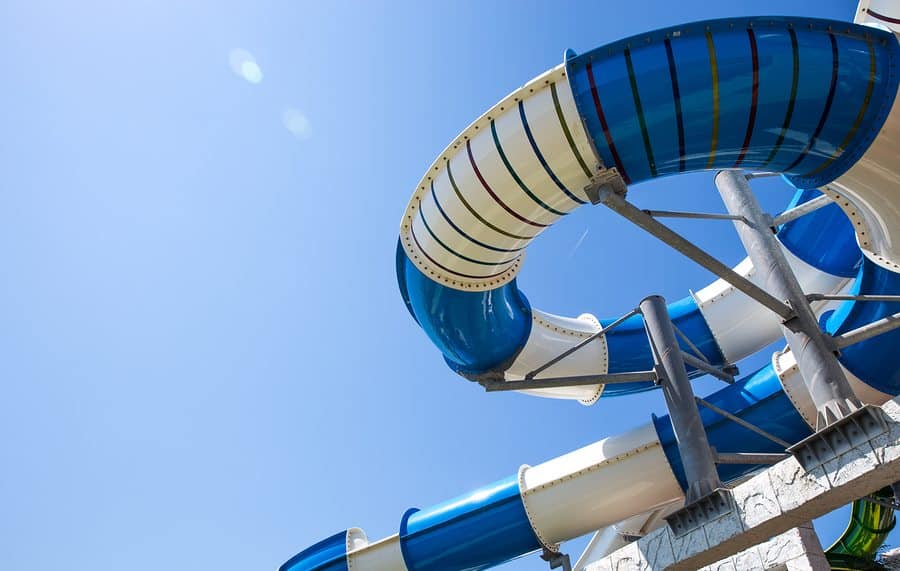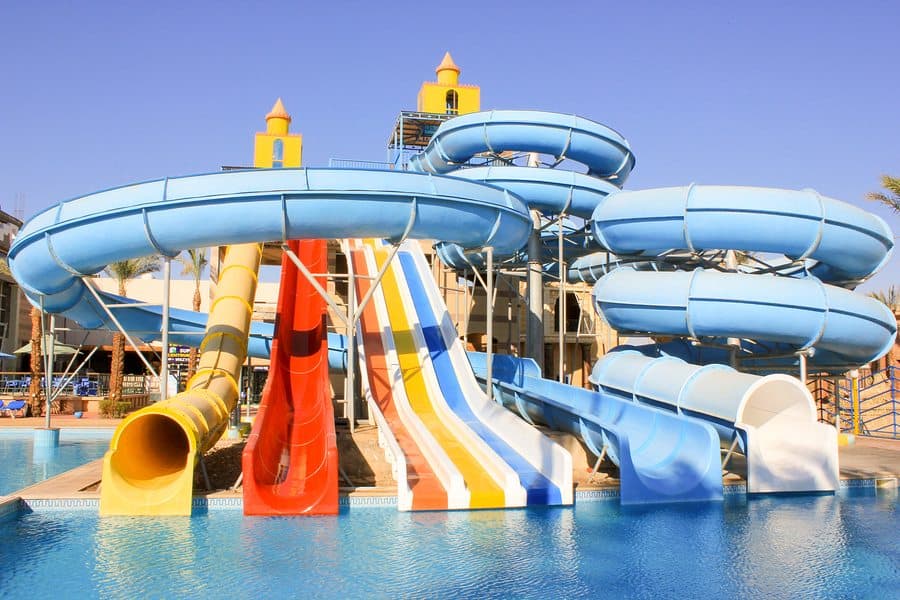Each year as the weather turns warmer, millions of Americans will flock to water parks in hopes of beating the heat. Unfortunately, thousands of these innocent patrons will be injured as a result of a water park accident. Some will even be killed by catastrophic injuries. These terrible incidents can leave victims and their families stranded with massive medical expenses, agonizing physical injuries, and long-lasting negative emotional impacts.
Recent Serious Waterpark Accidents
Many people tend to think of waterparks as being safe. This assumption is made by many because they assume that no harm can come from splashing down into water. Unfortunately, this assumption is extremely flawed. Serious accidents can happen at waterparks and water does not provide the “cushion” that most people expect. In fact, large bodies of standing water are often one of the biggest safety risks at a park.
For example, consider the reports of an August 2016 drowning at a Washington waterpark. Here, two men agreed to jump into the park’s wave pool and meet up at the water’s edge after swimming back to shore. After the one man swam back to shore, he did not see his friend. He decided that since his friend was a weak swimmer, he must not have jumped in and went to check another riding area.

Several minutes later, a lifeguard reported that she saw a body in the pool. However, search efforts were called off after several minutes. Just moments later, reports indicate that a young girl approached another lifeguard stating that she and a friend saw a “body at the bottom of the pool.” The lifeguard apparently dismissed the girl’s concerns stating that a follow-up search would occur in 10 to 20 minutes. About 25 to 30 minutes after the first report of a body in the pool, a lifeguard on an unrelated search for a park guest’s glasses found the body of the second man who had jumped into the wave pool. Investigators were looking into how no lifeguard saw the drowning man during his or her scans of the pool and furthermore whether search and rescue efforts were unnecessarily delayed by confusion regarding emergency response protocols.
What to Do After Suffering an Injury at a Waterpark
Being injured due to a malfunctioning waterpark attraction may be painful and frightening, but you must take certain actions to better bolster your case if you seek to file suit for your injuries.
The first step you should take when injured at an indoor waterpark is to get medical treatment. This is a vital step in your recovery and helps build important evidence.
Next, document your injury, specifically where and how it happened. For example, if you were injured while sliding down a waterslide you should take pictures of the waterslide from various angles and write down exactly how you were injured by using it. Of course, it may be difficult to document your injury and interview witnesses immediately after suffering a serious injury, but enlisting the aid of the family or friends you came with to do this is okay as well.
If you believe the injury was caused by an employee error or a design defect on one of the waterpark attractions make sure to document that as well.
The next step you want to take after being injured is to find and ask to interview any people who may have witnessed your injury and how it happened. It is important to gather witnesses who can confirm your allegations. You can use a friend or a family member as a witness, but using a party who has no interest in the case will help more.
After you have documented the injury and where it happened and interviewed witnesses, you should notify the indoor waterpark management of your injuries. This may result in receiving a call from the park’s insurance company who will seek to learn who is at fault for the accident. At this point, requesting the help of an experienced lawyer is vital.
Serious Accidents Can Occur on Waterslides
Unfortunately, wave pools aren’t the only potentially deadly attraction at a water park. The summer of 2016 was also marred by the death of a young boy on the world’s tallest waterslide. The death highlights the potential unpredictability of waterslide rides. Unlike a roller coaster where you are seated in a car that follows the exact same path each and every time, a waterslide raft will meander and careen down a slide guided by each raft’s unique weight distribution.
In fact, the grisly decapitation of the ten-year-old boy on the Verrückt water slide was ruled to have been caused by the uneven weight distribution. The young boy rode in the front of the raft with two adults weighing significantly more than him arranged in the rear. Due to the significant weight imbalance, the raft went airborne during the ride causing the boy to hit his head on the ride’s support structure. It is unknown what changes to the ride the park will institute to prevent another situation of this type. However, assuring that weight is evenly distributed on the raft is a minimum starting point for modifications.
Types of Waterpark Injuries Our Personal Injury Attorneys Handle
Due to the several attractions at indoor waterparks, and the many new attractions being built every day, the kinds of injuries sustained at an indoor waterpark can vary from minor to serious or fatal. Injuries can also happen when patrons are simply roaming the park, and they are not always foreseeable. Here are some of the types of injuries our personal injury attorneys handle:
- Slip and fall injuries
- Injuries caused by bacterial infections
- Bone fractures or broken bones
- Head and brain injuries
- Back and spinal cord injuries
- Joint injuries
- Lacerations
These are just some of the injuries which occur at indoor waterparks and is not an exclusive list of things you can sue an indoor waterpark for.
Who is Liable for an Indoor Waterpark Injuries?
Patrons who visit an indoor waterpark are considered an invitee for the purposes of a personal injury lawsuit. An invitee is a party who enters onto a landowner’s property to bestow a benefit to that landowner. A landowner, the owner of the indoor waterpark, has a duty to discover any dangerous conditions at their park and resolve that issue so that a patron is not hurt by it.
To show that the owner of an indoor waterpark is liable for the injuries, a party needs to show that:
- The indoor waterpark owners owed you a duty;
- That the owners of the waterpark breached that duty to you as a result of their negligence;
- Their breach caused your injuries; and
- You suffered actual harm as a result of the accident.
An employer, like a waterpark, can usually be held liable for its employees’ negligence. There is no requirement that the manager or owner directly harmed you for you to sue the waterpark.
Water Park Owners and Managers
Park managers should have the rides regularly inspected to ensure there are no defects or hazards that could result in injuries such as lacerations or cuts. Additionally, park employees need to be trained in the safe operation and use of the water slides and attractions. If a slide attendant is not paying attention, they could send people down a slide in quick succession, leading to collisions on the slide or in the discharge pool. Failing to report potentially dangerous conditions could also constitute negligence if a patron is later injured.
Third Parties Liable for Water Park Injuries
Third parties could also be liable for your damages depending on the circumstances surrounding your injury. For example, an employee could notice a defect in a water slide that could cut or otherwise injure a guest. They report it, the slide is closed for repairs, and a company is hired to fix the slide. If the repair company fails to correct the issue or creates an additional hazard that is unknown to the water park employees, liability could shift to the company hired to fix the slide. The park could still have some accountability if they failed to inspect the work before opening the slide to the public.
Manufacturers and Designers of Attractions or Equipment
A water park is made up of many parts, from the slides and attractions to the drainage and pool systems. In some cases, a defective piece of equipment creates a hazardous situation or causes an injury. A defected piece of equipment or a poorly manufactured part might not be apparent during a regular inspection of the park or its attractions. For example, a drain cover might have a design flaw or crack from the manufacturing process that causes a guest to suffer a severe injury. In this situation, the company that made the part could be held liable for any damages arising from the injury. More catastrophic injuries could occur when a very tall water slide has a dangerous manufacturing defect or a design flaw that results in patrons falling from the attraction.
In cases where liability arises from a design defect or manufacturing flaw, the injured party is not required to prove negligence. In a products liability lawsuit, the injured plaintiff only needs to show that the defect existed and that it caused the injury. Our water park ride accident attorneys will thoroughly investigate the facts surrounding your injury to ensure all the parties that share potential liability are included in the personal injury lawsuit.
What is the “Assumption of Risk” When Riding on a Water Park Slide?
Amusement park and water park operators customarily build their defense against injury claims around the doctrine of “assumption of risk.” Under ideal circumstances, this defense proves effective in court. However, the circumstances of amusement and water park accidents can be far from ideal, and defendants are often surprised and confounded—certainly not amused—when this doctrine fails to protect them.
The general principle of “assumption of risk” is this: if a patron of a park is made fully aware of the inherent risks involved in going on a ride, then the park is not liable for any injuries that ensue. As long as the park provided adequate signage and warnings, and it can be proven that the injury was not caused by negligence or unforeseen dangers, all is well. However, if something out of the ordinary occurred—for example, the person operating the ride failed to take proper precautions, warnings were inadequate, or the device was not properly maintained—all is not well, and it is the park operator who assumes the risk.
In the case of Atlanta Funtown, Inc. v. Crouch (1966), the court held that “assumption of risk” is highly appropriate “in the case of thrill-seeking patrons of amusement devices, if the facts of the cases demand an application of the doctrine.” The Georgia court thereby asserted that risk is a given in the amusement park realm, and that patrons are—or should be—aware of this risk.
It is this line of thought that gives park operators the idea that they are automatically protected by law. The way they see it, if you are looking for a thrill, you must face the consequences of thrill-seeking—and it is no one’s fault but your own if you happen to hurt yourself. But this “tough luck” attitude doesn’t always work.
According to the law, “. . . if one knowing and comprehending a danger voluntarily exposes oneself to it, though not negligent in doing so, he or she is deemed to have assumed the risk, and is precluded or prevented from recovering from an injury resulting from a danger.” Thus, if the risk of injury is “open and apparent” to a person embarking on an amusement park ride, and the person has voluntarily decided to do so, then he or she assumes the risks of taking the ride, and cannot recover for resulting injuries. However, if the participant does not know how “the risk is increased by unusual circumstances,” the situation becomes problematic.
Consider the case of Holbrook v. Prescott (1983), in which a teenage girl broke her leg on a water slide at Wet Willy’s, an amusement establishment of three water slides. Wet Willy’s cited the Atlanta Funtown case in its defense, arguing that the girl broke her leg because she failed to “exercise ordinary care.” However, the circumstances in this case were highly unusual. The teenager was with a group of friends who wanted to form a “train.” When she expressed her apprehension about this idea, the employee operating the ride assured her that it would be safe, since he would stop the water flow of the slide while the group was assembling itself at the top of the slide. The problem was that, when the attendant turned the water back on, the resulting surge of water caused the “train” to descend at a faster-than-normal speed, thereby creating unexpected danger. Because the girl was not aware of the greater risk that this action would cause, she was entitled to monetary recovery.
How Water Park Negligence Can Happen to You
Oftentimes, water parks and amusement parks will claim that an injury event was simply a “freak accident,” and that there were no faults with the attraction in question. However, these accidents are very rarely the result of “sheer chance” or “bad luck.” In reality, water park injuries are more frequently caused by factors like improper maintenance, lax supervision, and poor design of water park attractions. These factors can lead to drowning, submersion injuries, and unfortunately, wrongful death.

In today’s profit-focused and hyper-competitive economy, some parks may defer maintenance excessively or otherwise fail to keep their equipment in proper and safe operating condition. Parks interested in cost-cutting may also skimp on supervision,fail to properly screen new hires, or fail to adequately train staff members. In many cases, proper background checks for employees are never conducted, and park staff members are rarely given proper water safety instructions.
But it isn’t only poorly maintained rides and under-trained personnel which pose a threat to the well-being of park patrons. If the surfaces adjacent to a water park attraction are slippery and are not treated with non-skid materials, dangerous slips and falls can occur. Essentially there are many reasonable precautions that parks must take. Unfortunately, many do not and serious slip and fall accidents occur. These fall accidents can cause death or result in serious injuries, such as:
- Bone Fractures
- Skull Fractures
- Spinal Cord Injuries
- Twisted or sprained Ankle
- Chest or Heart Injuries
- Neck Injuries
- Back Injuries
- Crushing Fractures
Perhaps slip and falls are of particular concern at a waterpark due to the pools and large bodies of standing water. A guest who slips and falls into a pool can sustain significant injuries. If he or she was knocked unconscious during the fall, a severe fatal drowning risk exists.
Water Park Slide Risk Factors
People associate theme park accidents with roller coasters and other “extreme” rides. However, water-based rides arguably have even greater potential to cause injury or death if the park violates or disregards any safety procedures. Because many of these attractions appear to be tame, like the gently lapping swells of a pool, the danger of an accidental drowning death or slip and fall accident becomes all the more pronounced.
An analysis conducted by the New Jersey Department of Community Affairs uncovered that out of 552 incidents documented over the previous five years, 122 incidents (approximately 22%) took place on water rides. By comparison, roller coasters accounted for only 39.
Water parks are places friends and families go for relaxation and entertainment. Depending on the size of the park, many different types of attractions could be available for the park patrons to enjoy: from various types of water slides to lazy wandering rivers where guests can comfortably float around the park. However, every attraction at a water park presents certain risks. The risks increase when employees or management fail to keep a park safe.
Types of Water Slides and Attractions
Most water parks have several different types of water slides. Typically, a guest must climb a tower of stairs to reach the slide. The congestion of park patrons, especially if they are carrying tubes or rafts, often lead to falls and injuries. When the steps are slippery or lack adequate matting to ensure footing, guests are liable to slip and fall.
Ride Restrictions
Water slides might have height, size, and age restrictions. The risk of an injury increases if a slide attendant fails to enforce these restrictions. In the most catastrophic circumstances, a guest could be thrown from a slide, or a seam could rupture, sending multiple riders to the surface below.
Pools and Drowning
Water parks usually have many pools, including wave pools, discharge pools for water slides, and the famous lazy river winding around the park. Guests could drown or suffer a near-drowning experience, especially if they are struck by another park guest flying into the pool after riding down the slide.
Other Hazards at Water Parks
Water parks require electricity to function. If the electrical systems are not properly maintained or if there are exposed wires, a guest could suffer an electric shock or be electrocuted because of the excess of water.
Water parks are filled with wet surfaces and hard edges. It is not hard to imagine someone losing their footing on a slippery surface and injuring themselves. Water parks should ensure that thoroughfares have proper matting or a rubber surface to decrease the risk of falls.
Lack of Safety Enforcement on Some Water Park Slides
The Consumer Product Safety Commission (CPSC) doesn’t have the authority to maintain the safety of rides permanently fixed to a site. Instead, the organization only has authority over mobile rides that travel, like the ones found at County Fairs and carnivals. This is despite a CPSC report in 2005 demonstrating that injuries on fixed-site amusement park rides from 1997 to 2004 increased by nearly 25 percent as the number of park visitors only increased by 9.3 percent.
Exempting fixed-site amusement parks and water parks from federal regulation is a grave mistake, and far too many lives are negatively affected by such disregard for consumer safety.
The World Water Park Association (WWA), which is the prime water park organization in the United States, has estimated that there are more than 1,000 water parks and similar establishments across the nation. The organization also estimates that 80 million people visited water parks in 2011. How can the safety of millions simply be brushed off as if it doesn’t matter at all? Profits. The water park industry is highly profitable, yet neglects to ensure that paying and trusting customers are as safe and informed about dangers as possible.
Water Park Ride Safety Violations
Our experienced Philadelphia water park accident lawyers have litigated cases involving a wide variety of water park premises liability claims, including claims involving:
- Improper Designs
- Negligent Maintenance
- Under- and Over-filled Attractions
- Defective Water Slides
- Defective Water Park Rides
Water park rides have recommended filling levels for a reason. When a water ride is over- or under-filled, riders can travel either too rapidly, striking their heads or spinal columns against hard surfaces and side rails, or be ejected or thrown from a slide or fall from a great height. The owners and operators of water slides and water parks have an obligation to warn riders of potential risks involved, and any failure to do so may be considered to be an unreasonable and unsafe exposure to harm.
Even seemingly harmless wave pools can be dangerous to patrons when they are not properly regulated and maintained. Water park wave pools are frequently packed to capacity, making it difficult for the limited (and sometimes insufficient) number of lifeguards on duty to be able to see and adequately supervise all of the swimmers.
While swimming pools are supposed to follow the 2007 Virginia Graeme Baker Pool and Spa Safety Act, many are out of compliance. This act was designed to prevent the tragic and hidden hazard of drain entrapments in swimming pools, including water park wave pools. Unfortunately, many park owners have no idea what the Act is — or knowingly fail to comply.
The practical result of this is unsafe pool drains. Many times an inexperienced swimmer will be pulled down to the deeper water from the suction of the wave pool, where he or she may tragically drown or suffer serious internal injuries due to crushing or the suction force of a pool’s drain. To make matters worse, public swimming pools and water park attractions are often improperly cleaned, making it difficult for guards to see below the surface.
Suing for Drowning at a Water Park
Drowning is probably the most obvious danger specific to water parks. Unfortunately — whether the setting is a swimming pool, a lake, the ocean, or a water park — the victims sometimes go unnoticed, because drowning does not look the way many people assume it will. Contrary to popular belief, drowning does not usually involve screaming, thrashing, and splashing: in fact, just the opposite. More frequently, these accidents are actually very subtle. Look out for warning signs such as:
- An angled head that is tilted forward or back dramatically.
- Bobbing, repeatedly sinking below and reappearing above the waterline.
- Failure to shout, wave arms or move.
- Glassy, unfocused eyes, a blank stare.
- Hair obscuring the eyes, nose, or mouth.
- Low position in the water, often with the mouth at the water level.
The Reiff Law Firm: Pennsylvania Water Park Injury Lawyer
The Pennsylvania amusement park and water park accident lawyers of The Reiff Law Firm have litigated swimming pool, drowning, and water park accident cases for more than 35 years. We have investigated and litigated numerous water park accidents, including:
- Falls from water rides.
- Water ride entrapment.
- Back and vertebrae crush fractures due to water slide malfunction.
- Crashes and abrupt stopping due to poor design and inadequate water flow.
- Unsafe entrances or exits from rides.
- Slips and falls on wet surfaces near park rides.
- Broken bones resulting from improper crowd or personnel control.
- Improper passenger stacking and crowd control.
- Closed head trauma.
- Drowning and submersion accidents.
If you or a loved one has been hurt by a water park or swimming pool accident, don’t trust the park or pool operator to do the right thing. Most amusement park and water park operators have powerful legal defense teams on their side. Insurance representatives and claims adjusters work to save their insurance company money and do not work in the best interests of accident victims. For this reason, it is very important for accident victims not to sign any papers or agreements without consulting an experienced Pennsylvania accident lawyer first.
The attorneys of The Reiff Law Firm have been representing water park injury victims and the families of wrongful death victims since 1979. Call our law offices at (215) 709-6940, or contact us online today.















